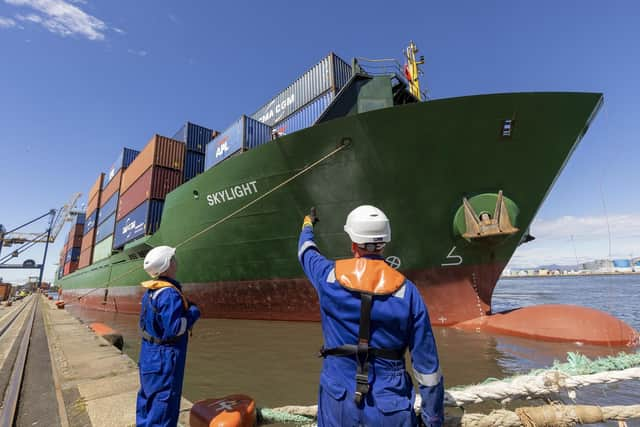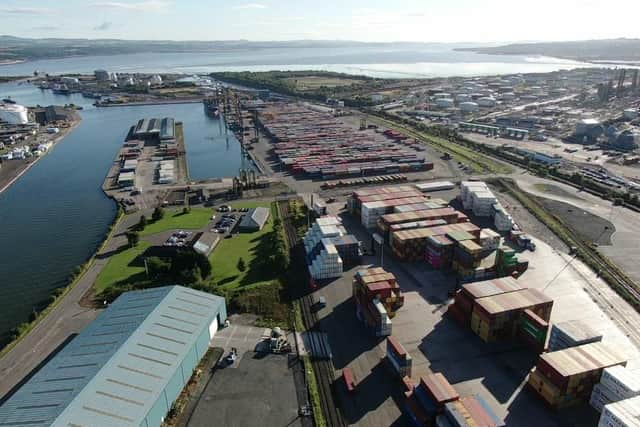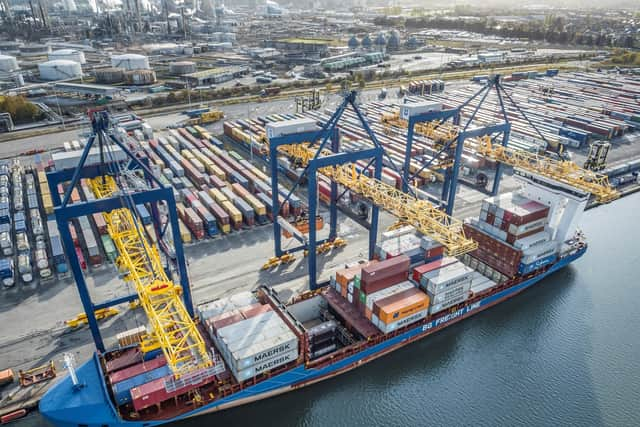Inside Grangemouth: Forth Ports complex handling 30% of Scotland’s economic output from lager to seed potatoes
Powdrake Road, a street in Grangemouth that branches off a roundabout and snakes past nondescript housing, is unremarkable in all but one respect – it carries £5 billion of goods a year.
It’s the main land access to Scotland’s busiest port, which is responsible for a remarkable 30 per cent of the country’s gross domestic product.
Advertisement
Hide AdAdvertisement
Hide AdThe 400-acre Forth Ports complex is also the only in the UK where exports outweigh imports, including alcoholic drinks such as whisky and beer destined for most parts of the world, along with seed potatoes, food, machinery and wood.


Together with goods brought in and out by rail, the total exceeds £6bn a year and is on the increase – although this could be affected if the threatened closure of the adjacent refinery goes ahead.
Container ships link Grangemouth direct with European ports and as feeder services to UK hub ports.
Ross McKissock, Forth Ports’ director of unitised – “trucks, trains, container ships and ferries” – is bullish about the future despite that cloud on the horizon.
He told the Rail Freight Group’s Scottish conference in the town: “It’s an absolutely critical component of the Scottish economy and we can only see that continuing to grow.”


Some 400 shipping containers move through the port every day to and from ships up to nearly 190m (650ft) long. Warehouses at the port containing these goods have grown to a total of 650,000 square feet – some ten football pitches – and are expected to expand to one million sqft within the next three years.
But Mr McKissock said the increase was just one aspect of site’s transformation.
He said: "The ports of old where you had sheds full of big, dusty, heavy equipment – that’s not the case now. We have sheds built to modern food standards that are housing fast-moving consumer goods – it’s a real shift in Scotland’s economy away from heavy industrial to manufactured exports.
Advertisement
Hide AdAdvertisement
Hide Ad"There isn’t an area [of the world] apart from Russia that we don’t export to – the global connectivity is absolutely second to none.”


Major Scottish brands whose products are exported through Grangemouth include Quaker Oats, Mackie’s, Tunnock’s, Young’s Seafood, AG Barr and Tennent’s Lager.
Mr McKissock said: "It is one of the few areas in the country where we are net exporters – the only net exporter in the UK. Scotland is in a really fortunate position because it has a relatively balanced supply chain coming into the UK for manufacturing."
Alcoholic goods – both raw materials and finished products – account for almost half the total.
Mr McKissock said of the port’s business: “[It is] big brands, principally food and drink, but also oil and gas, construction and renewables. There’s not many sectors the port doesn’t have an involvement in.”
Imports include fish meal for salmon farms, while the raw material for mooring rope for oil rigs comes in from China, is manufactured in Scotland and then exported back to China.
“Artisan” cereals are exported to the United States. Sherry casks are imported for shipment to Scotland’s distillers, with the bottled product coming back to be stored in warehouses before being exported.
Seed potatoes – planted to grow more potatoes – are one of Grangemouth’s lesser-known major exports. Most of Scotland’s 90,000 tonnes of those exported go through the port, some 60 per cent for Egypt.
Advertisement
Hide AdAdvertisement
Hide AdHowever, Patrick Hughes, strategic services director for the Scottish Agricultural Organisation Society, said the crop was exported to 28 countries, including Morocco, Saudi Arabia and Thailand.
The body, which helps Scotland’s 186 seed potato producers with exports, which accounts for 40 per cent of production, is also assisting the development of emerging markets elsewhere, such in Jordan, Ethiopia, Ghana, Kenya and Mauritius.
That focus is key because some 20,000 tonnes of exports to European Union countries were lost due to Brexit.
Forth Ports’ future focus is on creating a “green freeport” on the river, with Grangemouth teaming up with two of the group’s seven other ports at Leith and Rosyth, and Edinburgh Airport. It said the project was “absolutely critical to the decarbonisation of the Scottish economy”.
The scheme is seen as acting as a catalyst for new green technologies and renewable energy manufacturing, unlocking £6bn of private and public investment, with tax breaks and other incentives for companies setting up there.
Forth Ports said that would “help to transform Grangemouth and the surrounding industrial complex into a major low carbon logistics, fuels, processing and research and development centre for the Scottish economy”. “One of the huge aims of the freeport is about future fuels [such as hydrogen],” the body said.
Emissions could also be further reduced by transferring more of the port’s freight from road to rail.
Mr McKissock said: “For food and drink in particular, we absolutely see the opportunity for rail in Scotland."
Advertisement
Hide AdAdvertisement
Hide AdHowever, he warned: “If we are not better and quicker at converting smaller customers into rail, then they will continue to use road because it will be cheaper, more flexible and may be as green as rail by the time these [future] fuels are delivered. We have a really short window of opportunity to keep the conversion process going.”
Transport secretary Fiona Hyslop said: “The Port of Grangemouth is a crucial gateway to Scotland and has a key role to play in reducing transport emissions as well as supporting national, regional and local economies.
"Forth Ports should be congratulated for its commitment, and the actions it is taking, to achieve a net zero carbon operation by 2042.”
The company said Ineos, which runs the Grangemouth refinery with PetroChina, was its biggest customer, but declined to discuss how much of the port’s business it accounted for. The threatened refinery is only a part of the petrochemicals complex served by the port.
Comments
Want to join the conversation? Please or to comment on this article.